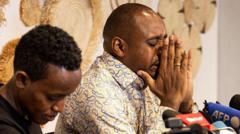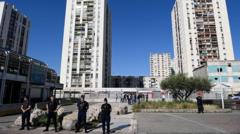Following distressing claims from Kenyan activist Boniface Mwangi about sexual torture in Tanzanian custody, both he and Ugandan activist Agather Atuhaire have called for accountability and highlighted the increasing repression in Tanzania. Mwangi's shocking testimony details graphic abuse while he and Atuhaire were held following their support for detained opposition leader Tundu Lissu, amidst rising fears of electoral repression in Tanzania.
Harrowing Testimonies Emerge from Kenyan Activists Detained in Tanzania

Harrowing Testimonies Emerge from Kenyan Activists Detained in Tanzania
Activists Boniface Mwangi and Agather Atuhaire recount tales of brutality and sexual torture during their detention in Tanzania, sparking international outcry.
A Kenyan activist has revealed his struggle for survival after allegedly facing severe sexual torture during a detention in Tanzania last month. Boniface Mwangi, who had traveled to Tanzania in solidarity with opposition leader Tundu Lissu, disclosed his ordeal at a press conference in Nairobi, expressing deep emotional scars from his experience.
Mwangi detailed horrific abuses, claiming that he was stripped, beaten, and sexually assaulted while held. His account has been met with skepticism by Tanzanian police chief Jumanne Muliro, who characterized the claims as "opinions" without evidence. However, the testimonies have ignited calls for an investigation from regional human rights organizations and Amnesty International, seizing attention as upcoming elections loom in Tanzania.
Agather Atuhaire, a fellow activist from Uganda who was detained alongside Mwangi, also shared her experiences of rape during their incarceration. At the press conference, she further illustrated the oppressive atmosphere facing activists in the region. Mwangi's narrative included unsettling details of his torturers demanding obedience, telling him to express gratitude to the Tanzanian president, while also intimidating him with threats of leaked footage of the abuse.
The traumatic impact on Mwangi's mental health was palpable as he spoke about lingering nightmares and feelings of vulnerability, leaving him in a state of distress. He insisted on the need for transparency regarding his physical injuries, emphasizing that this must never occur to others. Both Mwangi and Atuhaire had ventured into Tanzania to draw attention to Lissu's political struggles against governmental repression, and their detainment raised alarm across East Africa.
Despite prevailing in a difficult environment, activists from Kenya, including former Justice Minister Martha Karua, faced repercussions like deportation when trying to enter Tanzania in support of Lissu. Mwangi's experience served as a compelling illustration of the repression activists endure in East Africa, leading him to embrace a pan-African perspective in their ongoing fight for justice and rights across the continent. The U.S. Department of State expressed concern regarding the abuse reports, urging attention to the activists’ plight as well.
As calls for accountability reverberate, the political climate in Tanzania grows more precarious, with opposition voices increasingly silenced.



















